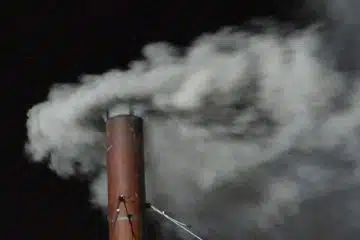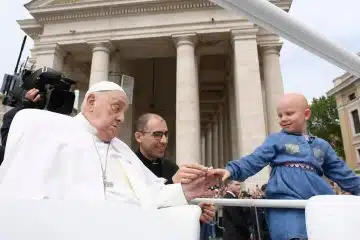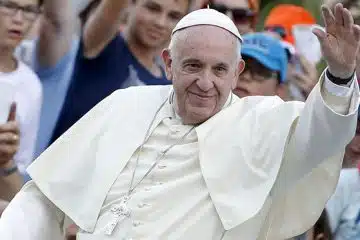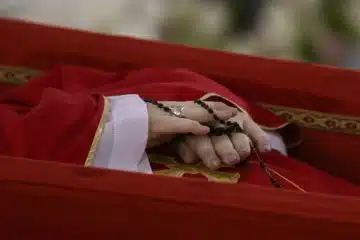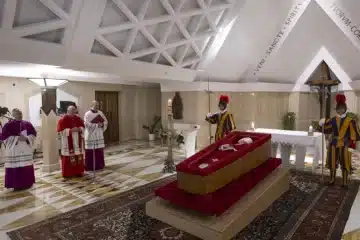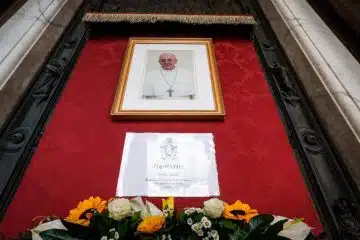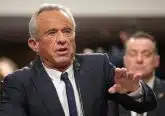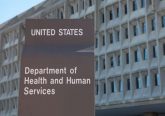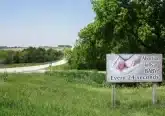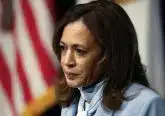Cardinal Turkson talks Biden, Holy Communion on HBO
by CNA Staff
Vatican City, Oct 4, 2021 / 18:26 pm
Cardinal Peter Turkson appeared to reject claims that President Joe Biden should be denied Holy Communion over his staunch pro-abortion rights stand, in remarks to a U.S. news show Sunday that touched on many topics, including COVID-19 vaccines, the Afghanistan conflict, and clergy sexual abuse.
Turkson appeared on the Axios on HBO news program broadcast Oct. 3. Show host Mike Allen cited the debate over whether pro-abortion rights politicians like President Joe Biden should be denied Holy Communion. Allen cited an unnamed bishop who said, “The Eucharist is being weaponized.”
“The Eucharist should not in any way become a weapon,” said Turkson.
“Do you have any question that President Biden is a Catholic in good standing?” Allen asked. “Should he be served communion?”
Turkson responded: “If you say somebody cannot receive Communion, you are basically doing a judgment that you are in a state of sin.”
“It sounds like you don’t think that should happen in the case of President Biden,” said the interviewer.
“No,” said Turkson. “You know, if, you know, a priest who’s distributing communion sees– unexpected all of a sudden somebody he knows to have committed murder, he’s meant to protect their dignity and the respect of that person.”
“So it’s for extreme cases?”
“Yeah. Those, for extreme cases, okay?” Turkson replied.
Turkson, who was born in Ghana, is prefect of the Dicastery for the Promotion of Integral Human Development.
Debates about reception of Holy Communion by pro-abortion rights are somewhat unique to the American political context, where many politicians present themselves as devout Catholics but also support legal abortion. Elsewhere in the world, such political leaders are much less common.
Canon 915 of the Church’s Code of Canon Law states that Catholics “obstinately persevering in manifest grave sin are not to be admitted to holy communion.” Then-Cardinal Joseph Ratzinger, in a 2004 memo to the U.S. bishops in his role as Prefect for the Congregation for the Doctrine of the Faith, said that Catholic politicians who are “consistently campaigning and voting for permissive abortion and euthanasia laws” are considered to be formally cooperating in the grave sin of abortion, and in a “manifest” way.
In such cases, Ratzinger said, the pastor of the official must meet with them and admonish them, instructing them that they cannot receive Communion. If the politicians persist in their pro-abortion advocacy, the minister of Communion “must refuse to distribute it,” he said.
The U.S. bishops in June voted to draft a formal statement on what the Eucharist means in the Church. They have cited lack of understanding among Catholics about Church teaching and about worthiness to receive Holy Communion, and some discussion brought up the matter of prominent pro-abortion rights Catholic politicians.
In June, U.S. Rep. Ted Lieu (D-Calif.), took to Twitter to dare the U.S. bishops to deny him Holy Communion over his support for contraception, legal abortion, and same-sex marriage. The Democratic Party has become strongly pro-abortion rights in recent decades and tensions have increased as a Republican-dominated Supreme Court appears set to change precedent mandating legal abortion nationwide.
Turkson’s other comments discussed a lack of action in global development efforts.
“We talk more than we do. We talk a lot, and we do very little,” he told Axios on HBO. “Some president, some head of state, says ‘When I go back, every parliamentarian in my country will use an electric car.’ It’s not happened.”
The Church tries to move people to action through “appeal and encouragement,” he said, adding “We’re going to try to bring the cry of the poor and the cry of the earth there.”
On the question of vaccine distribution, Turkson noted that Biden is trying to deliver on promises to vaccinate enough Americans. Global gatherings like G7 and G20 conferences witnessed “a lot of promises” about how many vaccine doses would be made available for Africa and other countries.
While he agreed that wealthy countries can and need to do more, he said, “I basically would wish to encourage heads of state and leaders in Africa to also explore traditional therapies for this.”
“If local heads of state were to promote local herbal medication, our dependence will not be 100% on vaccines,” he said, adding, “we need to diversify our therapies.”
When the host asked Turkson if he doubted that taking the vaccine, for most people, is “wise and helpful,” Turkson responded: “No, certainly.”
Allen framed Catholic teaching on the ordination of women as a matter of rights. Turkson told Allen that he never had a “personal struggle” with Catholic teaching on this point.
“Is that a question of rights? Not even men who are ordained consider that to be a right.”
On the matter of sexual abuse, the cardinal said that all the young people who enter seminary and convents are “products of a society.”
“I’m not blaming society for crime,” he said, adding that it is not necessary to be oblivious to “factors that influence the lives of people who come to become priests.”
“They come from certain backgrounds, and we don’t know what has contaminated them from that background,” he said. Some could be victims of abuse themselves.
He advocated efforts to ensure prospective priests’ characters are fully developed and known before they are ordained and show abusive tendencies “to the embarrassment of the Church and everybody.”
Turkson, who is black, discussed racism. He said, “Certainly the Church can do more. There was a time when Church institutions owned slaves because it was the turn of the time, as it were.”
“What is past is past,” he said, while endorsing “Reparation if it can be made can be made.” There must also be a call for resolve “not to repeat past errors.
The interview touched on remarks about the Afghanistan conflict, in which he had said that not all eventualities were taken into account. He said the U.S. went into the country with “vengeance” and a “war posture” to get the “culprit.”
“If U.S. had gone in first not even with a militant posture but to talk, we’d be living with a completely different situation now,” said Turkson.
“I recognize the complexity of the situation. But this becomes a lesson for international diplomacy,” he said, encouraging more efforts to talk and seek reconciliation.


